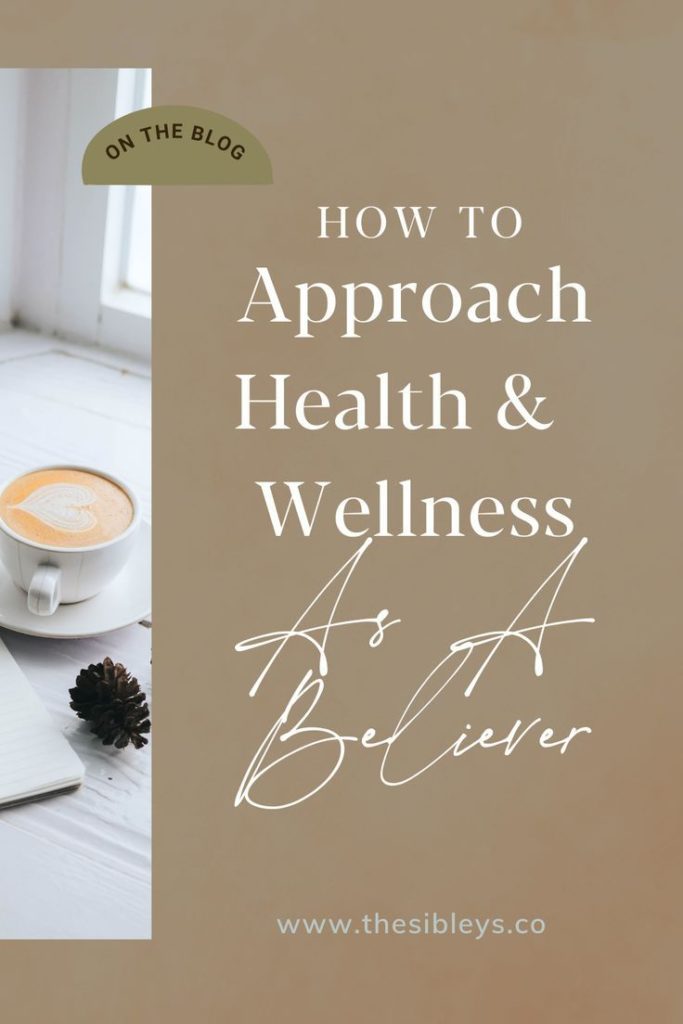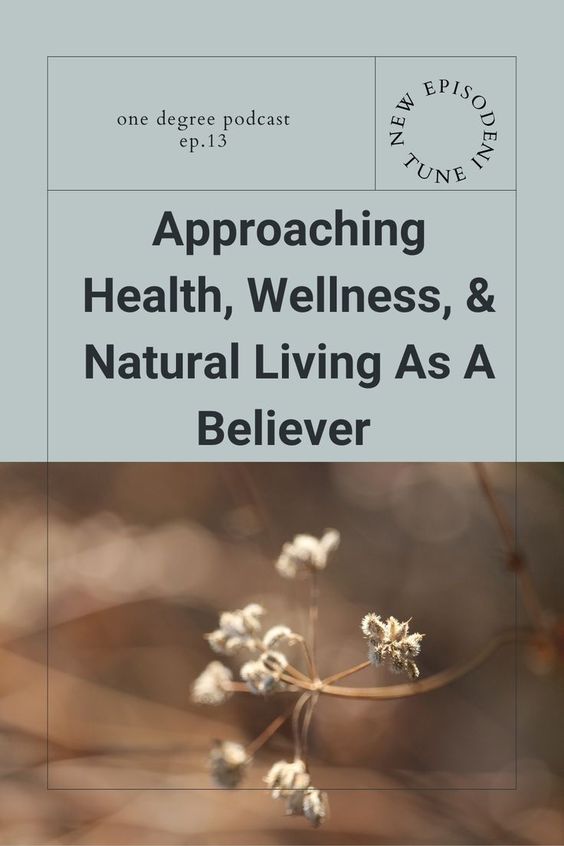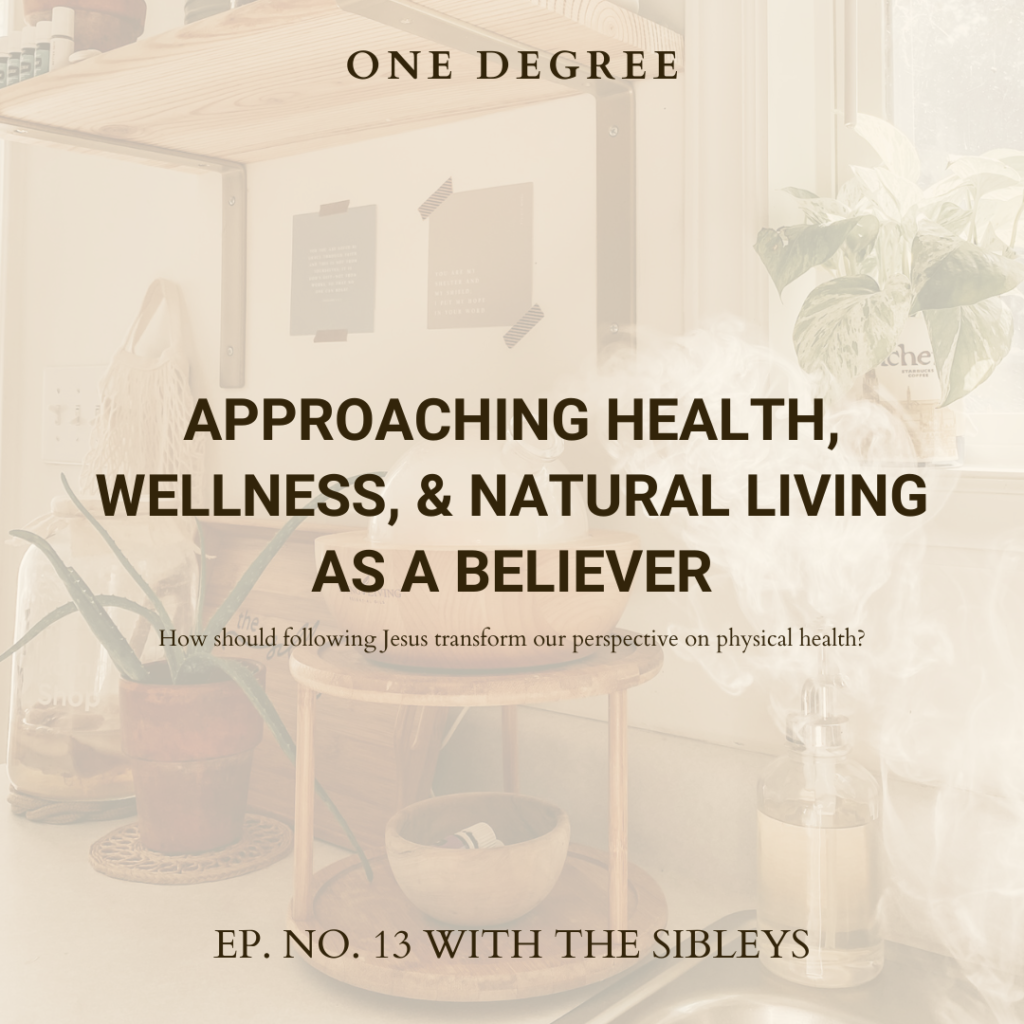What’s all the buzz around “nontoxic living” and health? Should being a Christian change our approach to exercise, sleep, and food choices? What about the types of products that fill our home?
In this episode we get real about two different camps people often fall into. First, the camp that tends to let their physical health fall to the wayside. And second, the camp that tends to hold their control of their physical health maybe a little too tightly.
As always, we’ll get into what the Bible says, and practically flesh out how this should transform our lives.
What even is nontoxic/holistic health/clean living?
We wanted to do this episode because nontoxic/holistic/clean living have become very buzzy words and trendy things in our society over the past few years. All it takes it a walk down a Target aisle to see “plant based” and “made with essential oils.” There’s been an obvious branding shift to more earthy, natural aesthetics. There’s been a cultural shift toward cleaner living and the emphasis on exercise and nutritional health has been around for even longer, so we just want to take some time to flesh out how these things apply to us as believers.
Xan is definitely “crunchy”. On the scale of creamy to extra crunchy PB, she’s in the medium-extra crunchy range. But we think it would be helpful to define exactly what we’re talking about. Holistic health would be a good way to refer to this concept.
Health from a holistic perspective
We don’t want to view health through a narrowed lens. For the sake of this episode, the components of physical health we’re going to address are: exercise, sleep, addressing root causes, clean ingredients in food and products. We’re not going to be diving into mental health. We’re not going to be talking about “energy medicine” or “spiritual attunement” and other New Age treatments and perspectives like those.
Christians can often fall into one of two camps:
The first, saying “God is sovereign. He’s gonna take me when he takes me.” And not prioritizing stewarding their bodies well.
The second taking more of a “If it’s not grass fed, grass finished, certified organic steak, I’m not going to eat it.” And more creating an idol out of clean living.
To simplify it: one camp leans towards gluttony, while the other leans toward an idol of self-control (maybe in the name of being a “gatekeeper of the home”)
This episode isn’t going to be a tutorial on detoxing your home, as much as answering the question how should a Bible-believing follower of Jesus view clean living and physical health?

What does Scripture say about caring for our bodies and health?
We can hopefully all agree that the Bible is very clear that we are to take good care of our bodies.
1 Corinthians 10:31 says, “so whether you eat or drink, or whatever you do, do all to the glory of God.” We can probably all understand that treating our stomachs like they’re trash cans wouldn’t be glorifying to God. This verse highlights a posture of desiring to glorify God with our bodies and not just blow off our health, more than giving a hard-pressed “do this, don’t do that” instruction.
1 Corinthians 6:19-20 discusses our body being a temple. Many people often take this verse out of context – it’s actually talking about the fact we shouldn’t give our bodies to prostitutes. But at the same time, there’s this implication that our bodies are given to us by God and we should steward them well. I’ve heard very few Christians attempt to justify that it doesn’t matter what they do with their money, so why would we think that our physical bodies are any different?
In an article John Piper wrote, “But there’s another text that comes closer. Earlier in that chapter he is not dealing with prostitutes; he is dealing with food. The slogan in Corinth is—I think it’s a slogan in Corinth—”The stomach for food and food for the stomach, and both will be destroyed in hell,” which implied in their docetic way, “Eat all you want. It doesn’t matter what you eat.” And Paul said, “True statement, but I will not be enslaved by anything!” And the context there is food.”
John Piper is referring to verse 12 in this. Enslavement is the problem we’re looking at with physical health: enslavement to laziness, or enslavement to food. Whether it’s eating too much, or exercising too little and then having physical maladies because of those choices, those are considered spiritual issues to God.
What does a Biblical approach to physical health look like in action?
We should aim to do everything our power, without creating an idol, to take care of ourselves for the sake of serving God better, in the power of the Holy Spirit. We should be allowing the Spirit to work through us to empower us to take care of ourselves.
FOOD
If we’re eating junk food, or food with lots of additives, and they’re making us feel lethargic, have headaches, etc, we should fight it by the power of the Spirit. Of course, everything in moderation. Nathaniel went to the store today and bought three pints of Ben & Jerry’s ice cream and we will eat them. But if your go-to foods are those that aren’t serving your body well, you should evaluate that. And this isn’t an issue of weight. Sometimes the people who look healthy are not fueling their bodies well at all. This isn’t a matter of body image – it’s a matter of the overall health of your body because of how you’re taking care of yourself.
Nathaniel discusses how when he really started keeping track of what he was eating, he realized just how much junk food he was eating while at work. Before then, he thought he was pretty healthy, then he realized he was eating the equivalent of three full-sized chocolate bars throughout the day, along with a bag of chips and other sweets.
If we’re honest, thinking we’re eating healthier than we are is likely the case for many of us.
SLEEP
If you’re listening to this, you’re likely in your 20s or 30s, and that’s a season where we tend to not pay too much attention to how much sleep we should be getting. We should strive for eight hours of sleep a night, but of course, different seasons of life will dictate this. If you have a newborn around, this is likely not a season where you’ll be able to prioritize eight hours of sleep, no matter what you do.
At the same time, if we’re honest with ourselves, we most likely do have the time to get more sleep than we’re currently getting. Cut out the Netflix, shut off the scroll at night. Even beyond the time spent on those apps, if you’re stimulating your eyes with blue light at night, you’re preventing your body from producing ideal levels of melatonin at night to get solid rest. When you do go to sleep, you’re preventing yourself from getting deep, restful sleep.
College is a time where the “I can’t sleep enough because I have so much to do” excuse is rampant. But if we’re being honest, cutting some things out would definitely allow for adequate sleep. And sleeping will benefit your studying more. You’re going to be so much more focused when you’re studying.

EXERCISE
We should be aiming to at least move our bodies every day. It doesn’t mean you need to go to the gym, or join a group fitness class, or take up running. It can mean those things if those are best for your physical/mental/spiritual health, but it’s mostly about not letting the sin of slothfulness creep into your life.
Aim for 150 minutes a week of moderate-intense physical activity and two days of muscle training or building a week. Numbers aside, when you start moving your body, you’re going to feel good. It’s scientifically proven that regular exercise can increase self-confidence, improve your mood, help you relax, and lower symptom of mild depression and anxiety.
MEDICINE
Of course we’re not doctors and we’re not giving medical advice here.
If we can use remedies, for whatever it may be, that have as few negative side effects as possible (unlike most mainstream pharmaceuticals), it makes sense that we should pursue those.
Without going into a tangent, Western medicine typically treats symptoms, rather than the root cause. For instance, Xan went to the doctor in the past few months, and 99% of the appointment was spent discussing medications and vaccines and she was never asked about her food, sleep, or exercise habits. So often going to the doctor is about finding a quick fix.
Sometimes we can’t avoid it, but when possible, we should do everything in our power to address root causes without jumping to extreme solutions, because it’s best for the long game of our health. As always, play the long game.
Many symptoms of anxiety and depression can be resolved by food, sleep, and exercise. Many can’t! But before jumping to drastic measures, start with simple ones. If you still struggle after, there’s always the option of additional health.
CLEAN PRODUCTS
If we can mindful of the products we’re using in and around our kids, absolutely we should. It’s glorifying to the Lord to take care of our bodies, and those that have been entrusted to us while they’re unable to care for themselves.
For a simplified example, there have been countless studies that show that conventional sunscreen has synthetic chemicals that can lead to skin cancer. It’s rather ironic that the same sunscreen that is supposed to prevent skin cancer can actually cause it.
As you start digging into it, it’s shocking how many ingredients are permitted in the USA that are banned in the EU.
Ultimately, the better health we’re in, the fewer physical limitations we’ll have to hinder us from being sold out to serving and loving people well.
We need to be careful not to idolize healthy living
It can be easy to idolize the control we have as “gatekeepers” of our homes. The Bible talks a lot about idols. The Second Commandment is to have no graven images or idols. And we really can turn healthy, nontoxic living into modern day golden calves.
The point of caring about what we’re putting in, on, and around our bodies shouldn’t be motivated by fear, but a desire to steward our bodies well so we can be the most faithful followers of Christ, and do everything in our power to live a long life where we can be actively serving the Lord and glorifying him. If something is rooted in fear, that may be an indicator that we are holding it as an idol and holding it too tightly. There’s a difference between consciousness/wisdom/discernment and fear. We must acknowledge that we’re not in control, only God is sovereign, and shouldn’t idolize that control.
God is sovereign over our lives and health
Matthew 10:29-31 ESV
29 Are not two sparrows sold for a penny? And not one of them will fall to the ground apart from your Father. 30 But even the hairs of your head are all numbered. 31 Fear not, therefore; you are of more value than many sparrows.
Even if we are meticulous to allow no toxins into our body (which is impossible), in God’s sovereignty, we still may die of cancer. Even if we exercise daily, we may still die of a heart attack. We live in a fallen world where disease and sickness exist and true physical healing doesn’t exist on this side of heaven.
We need to be careful not to judge those who are behind us
As believers, we should strive to call people up rather than look down on them. We should be encouraging those around us, especially fellow believers, to better their health.
One degree shifts
For the first camp:
- Keep track of the food you eat this week. Write it down, see where you can replace certain unhealthy foods with healthy ones.
- Research the ingredients in your food and home products
- Move your body every day (go for walks, do some YouTube yoga, join a gym, etc.)
For the second camp:
- Skip your workout to minister to someone, help them move, watch their kids, etc.
- Take a homeless person to McDonalds to share a meal
- Wake up in the middle of the night to get the kids so your spouse can get a full night’s sleep
- Reach out to someone to run or workout with, even if they aren’t “on your level”

More Episodes to Add to Your Queue:
Establishing Healthy Rhythms for Couples + Families
Guide to Your Weekly Marriage Meeting
“Are We on the Same Page” Spouse Evaluation
In a Culture of Quick Fixes, Play the Long Game
LEAVE A REVIEW
If you’re loving this podcast, we’d be so grateful if you took a minute to leave us a review!
WANT TO CONTINUE LEARNING FROM US?
- Download: Guide to Your Weekly Marriage Meeting to start being intentional with your weekly communication today
- Subscribe to our weekly newsletter, where we deliver encouragement and exclusive tips to your inbox once a week
- Follow along on Instagram for even more education, news, and fun

+ show Comments
- Hide Comments
add a comment